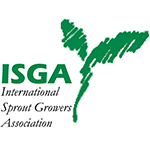Focus on Broccoli Sprouts
World Cancer Day is on Wednesday, February 4. Professional and scientific organizations, chapters of cancer survivor organizations, and representatives from governments around the world are promoting cancer awareness. It is a day for raising awareness through documentaries, informational displays, professional conferences and, in some countries, free medical consultations.
This year’s campaign focuses on four areas: healthy life choices, delivering early detection, achieving treatment for all, and maximizing quality of life. We at ISGA will concentrate on the role of broccoli sprouts as a functional food which can interfere with the growth cycle of cancer cells. Functional foods contain medicinal compounds that can fight disease.
Each year there are hundreds of studies on the potential of plant nutrients to prevent a wide variety of cancers. A large number of these studies involve broccoli sprouts and sulforaphane, a phytochemical found in cruciferous vegetables. Sulforaphane is an antioxidant, a chemical that blocks the activity of free radicals which can cause damage to cells that may lead to cancer. Sulforaphane is also a stimulator of natural detoxifying enzymes. Broccoli sprouts are the richest source of sulforaphane.
Below are brief summaries of studies focused on the chemical properties of broccoli sprouts and their effect on a variety of cancers:
Stomach cancer
Infection with the bacterium H.pylori can cause stomach ulcers and markedly increases the risk of developing stomach cancer. In vitro and animal experiments showed potent and selective antibacterial properties of sulforaphane and sulforaphane’s ability to selectively target the H. pylori bacteria, which are often difficult to eradicate.
In a Japanese study involving patients infected with H. pylori bacteria, patients eating 100 grams (approximately 3.5 ounces) of broccoli sprouts daily for two months experienced substantially reduced measures of H. pylori infection when compared with control subjects fed a vegetable with no glucoraphanin. (Glucoraphanin is needed to produce sulforaphane.)
Breast cancer
Work from Johns Hopkins, published in 1994, demonstrated chemoprotective effects of sulforaphane, showing its ability to reduce mammary tumor formation in rats. Scientists at Shanghai Cancer Center in China conducted a retrospective (epidemiological) study of 350 pairs of women. One of each pair had breast cancer. The other was cancer-free. The study results revealed the women who had eaten higher levels of Brassica vegetables—broccoli, cabbage, cauliflower and kale—all of which contain glucoraphanin and related compounds—were 50% less likely to be diagnosed with breast cancer. Cornblatt and colleagues (2007) have now shown that sulforaphane actually reaches breast tissue in humans within an hour or so of consumption.
Prostate cancer
Human prostate cancer cells responded to treatment with sulforaphane in the form of broccoli sprout extracts, showing dramatic increases in their Phase 2 protective enzymes. Dr. James D. Brooks, Urology Department, Stanford University, suggests broccoli sprouts, a rich natural source of sulforaphane, might be appropriate for use in intervention trials in humans.
Colon cancer
American Health Foundation researchers showed sulforaphane significantly inhibited the formation of colon cancer in rats. Much work has demonstrated the ability of sulforaphane and broccoli sprouts extracts to inhibit cancer in vitro in human colon cancer cells.
Bladder cancer
Epidemiological evidence strongly suggested a role for cruciferous vegetables in prevention of bladder cancer. Indeed, although an analysis of 47,909 men in the Health Professionals Follow-Up Study showed virtually no correlation between cancer reduction and high consumption of fruits and vegetables overall or yellow or green leafy vegetables specifically, it did show a statistically significant reduction among those men who consumed large amounts of cruciferous vegetables.
Several studies have suggested the bladder is one of the most responsive organs to induction of detoxification enzymes by extract. This was demonstrated in human bladder cancer cells in vitro and using broccoli sprouts, rich in sulforaphane potential, in animal models in vivo. In addition, studies have also shown sulforaphane and broccoli sprout extract can induce apoptosis (programmed cell death) and cell cycle arrest in human bladder cancer cells in vitro, while showing the activity levels from pure sulforaphane and broccoli sprout extracts were virtually equivalent. This confirmed that this effect is due exclusively to the sulforaphane potential in the sprouts, not other components.
Impact on developing or developed cancers
French researchers showed sulforaphane might do more than just activate antioxidants. Their research describes the ability of sulforaphane to cause cancer cells to self-destruct, known as apoptosis. The multidimensional ability of sulforaphane both to eliminate or detoxify carcinogens and to kill cells with potential cancer-causing mutations suggests sulforaphane may have broader effects on developed cancer at various stages, as well as prevention.
In conclusion, broccoli sprouts show great promise in preventing a wide variety of cancers and in killing existing cancer cells. The next step in unveiling the potential of broccoli sprouts to prevent the development of cancers and control or eradicate existing cancers is additional studies involving larger numbers of human subjects.

